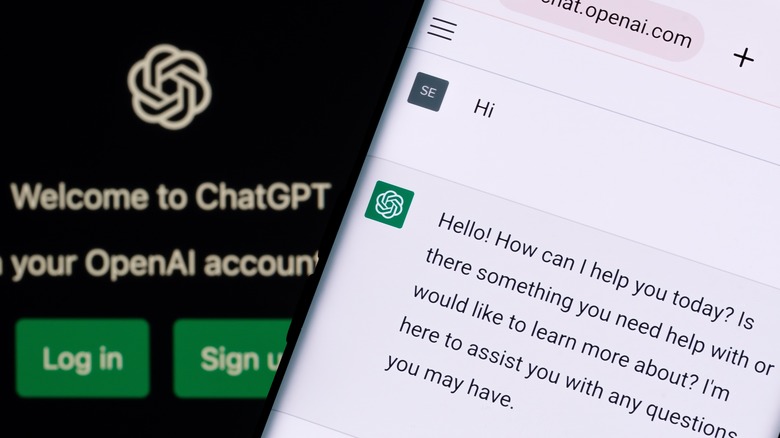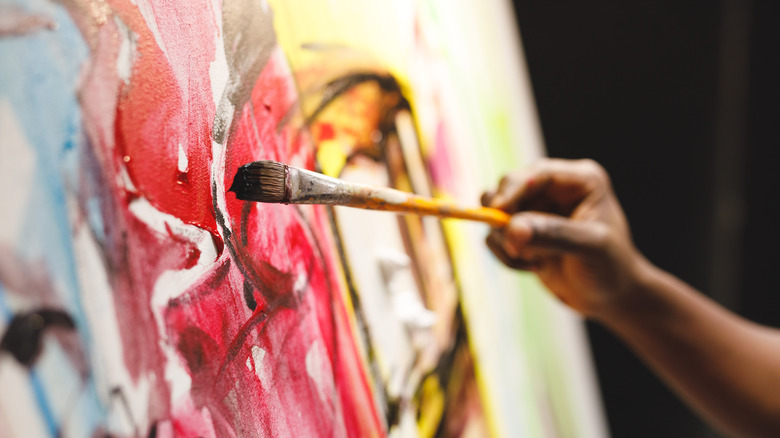These Jobs Are At Risk Of Being Replaced By Chatbots Such As ChatGPT
Chatbots are not a new phenomenon in the world of AI and customer service. People have been interacting with virtual response engines while seeking answers about their bookings, purchases, and more for many years. One thing that has changed recently though is the emergence of highly skilled AI language models that can autonomously produce text, images, and code. Specifically, these new tools have become increasingly adept at delivering technically proficient outputs. Exploring a free trial of ChatGPT for this article (and only in this single instance), I asked the AI "How can you help me?" Magnificently, it responded in a matter of seconds: "I can assist you in several ways such as answering questions, providing information on a wide range of topics, generating text, assisting with decision-making, and much more" (via OpenAI). This answer perhaps sounds a bit generic, but to be fair to the system, so was the question.
The Guardian notes that ChatGPT can be leveraged to answer "the biggest and smallest questions in life." Quite a tall order, indeed! While the program has made its way into the world of college essay writing, perhaps the scariest application of ChatGPT and other AI toolboxes that perform text-generating functions is the redundancy that some career professionals may be faced with in the coming months and years. ChatGPT can produce snippets of text at the moment and isn't connected to the internet. But it's only a matter of time before these AI solutions may phase some human workers out of their livelihoods or fundamentally alter their roles.
Artists who work in bulk production
It might seem like the segment of workers sweating over the proliferation of AI chatbots would be contained to those working in writing fields. However, these tools are also being leveraged to produce amazing works of art. The New York Times reported in September 2022 that an artist had used an AI tool called Midjourney to produce an award-winning work of art. The piece, created by Jason Allen won first place in the digital category of the Colorado State Fair's art contest. The piece in question "Theatre D'opera Spatial" is resoundingly beautiful. There's a sense of grandness in the piece and the combination of a bright focal point in the center contrasted against darker and richer tones as the eye works its way out to the edges leaves viewers with a sense of awe.
Midjourney, and other image-generating AI tools, take strings of text and translate them into images. With a bit of tinkering, an artist can produce virtually any kind of finished product without ever lifting a brush or sketching out the whispers of an idea. While AI will certainly never replace the artistry and human touch that goes into masterworks, the bulk paintings that often hang in modern households may leave human artists behind. As a result of continually improving AI image-generating capacity, the need for humans to painstakingly paint out these canvasses may erode.
Mid-level writers in advertising and elsewhere
Writers are certainly on the chopping block when it comes to the advancement of text-generating AIs. Futurism reported in January that CNET began using AI to generate some articles for its site at the end of 2022. In a sarcastic response, BuzzFeed News used ChatGPT to generate an article about CNET's use, noting at the bottom of the short work that the editors "had to rewrite the prompt a few times to get it to stop inserting factual errors."
Writers across the spectrum may be looking at a squeeze out of the more generic writing tasks that they handle. Creating human resource letters, drafting press releases, and banging out a typical copy for advertising or explainer needs may all fall into the increasingly competent laps of AI programs (via CBS News). These developments may drive writers into a more editorial role on the whole. BuzzFeed News and Croud are both quick to point out that ChatGPT is a tool that can be used for content creation, but it isn't a writer. There's something innately human about the fount of ideas that pour out of the human mind. When putting pen to paper, writers build a world of subtlety that hinges on the collective human understanding of other written ideas. While AI systems can produce tomes of text, this spirit isn't something they will likely ever be able to capture. However, removing the monotony of writing basic text that doesn't require gushing imagination can leave writers to focus on other components of the work.
Computer programmers
While computer programmers and writers might not seem like two groups that overlap much on the surface, their workflows are eerily similar. The nitty-gritty of computer programming is an awful lot like the day-to-day keyboard pounding that a writer goes through. The language may be different (Python versus English, for instance), but the process is very closely aligned.
Science reported in December 2022 that a new AI system called AlphaCode has taken a giant stride forward in the world of AI-generated coding. AlphaCode can work through more than a million code iterations to find viable solutions to the input parameters. Codex, the next best thing in space, can generate tens or hundreds of possible solutions at a time. In a similar fashion to other professions on this list, programmers will be able to shed the grunt work and tasks that require carbon-copying features from one repository to another with the help of AI tools. They will still be needed in the field, however. Computer programmers build out fantastical worlds as well, and the fruits of their labor range from the productivity tools that businesses use on a daily basis to the games that countless people relax with. CBS News reports that it's likely that ChatGPT and other AIs may be used as an automated check on code to limit a programmer's time spent troubleshooting issues line by line.
Legal document preparers
Finally, an area that may be the most surprising to casual viewers of this phenomenon is the legal profession. CBS News reports that much of the preparation of legal documents is actually quite a redundant process already. 90% of the work that goes into just about any legal document (lease agreements, wills, employment contracts, etc.) is boilerplate language. It can simply be copied over from a master file or previous form. The grunt work required to finish a legal filing or contract is therefore time-consuming and often boring for those trained in the nuances of the law. Instead, CBS News notes that some of the early stages of document preparation in the legal field may soon be done by AI. Of course, as with the roles already listed, there remains a human element to this process. A lawyer will ultimately need to edit, review, and sign off on the documentation before it can be sent out to a recipient.
However, it should be noted that AI tools have already become so proficient at writing and synthesizing information that ChatGPT's performance has earned a passing grade on a law school exam (via CBS News). The potency that these AI features bring to the workplace will make people's lives easier. By reducing the monotonous tasks from a worker's daily schedule, it will free up time for more important business and the minute details that make the difference.




